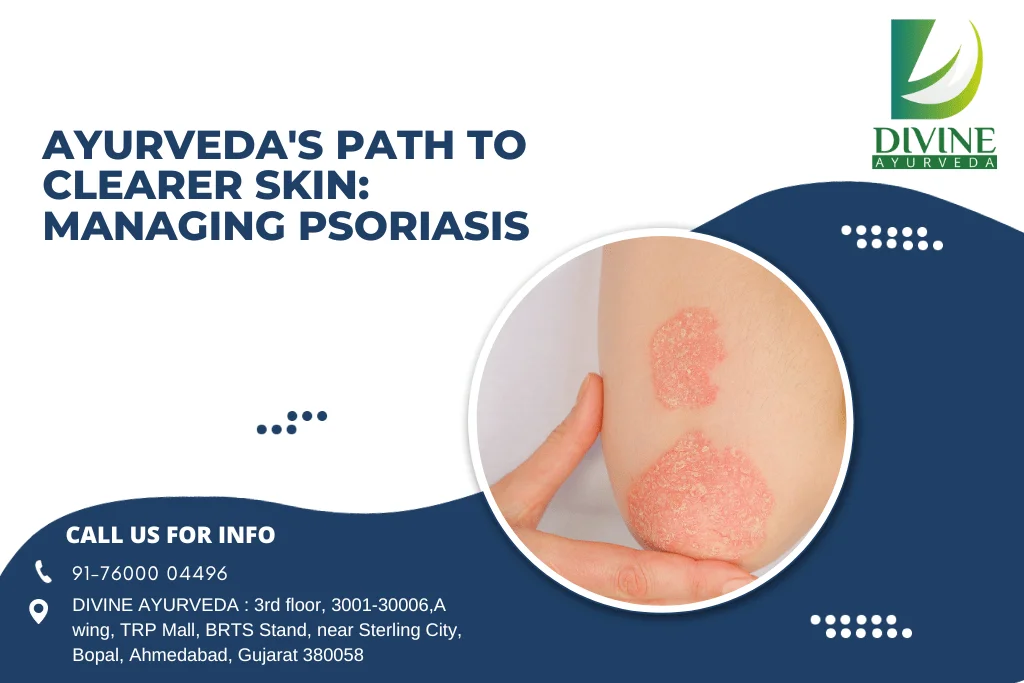What is Psoriasis?
Psoriasis is a progressive autoimmune skin disorder characterized by the fast development of dead skin cells. This cell buildup causes the skin to develop thick, shiny scales and itchy, dry, often painful red areas. Psoriasis is not transmitted and can range from mild to severe in frequency.
Facts about psoriasis
Psoriasis affects roughly 2-4% of the global population.
Autoimmune Disorder: Psoriasis is classified as an autoimmune condition because the immune system wrongly targets healthy skin cells, causing them to grow rapidly. This increased cell turnover is what causes the typical skin plaques and scales.
Genetic Predisposition: Psoriasis has a genetic root because it runs in generations. However, not all people with a psoriasis history in the family will get the disorder.
Triggers: Psoriasis can be generated or increased by a variety of circumstances, including stress, infections, skin injuries (such as cuts or burns), certain drugs, smoking, and alcohol intake.
Types: Types of psoriasis include plaque psoriasis (the most prevalent), guttate psoriasis, inverse psoriasis, pustular psoriasis, erythrodermic psoriasis, and nail psoriasis.
Symptoms: signs of psoriasis vary depending on the type, but they commonly include red blistering areas of skin with silvery scales, itching, burning, and, in some cases, pain. Psoriasis can affect the scalp, elbows, knees, palms, soles of the feet, and nails.
Psoriatic Arthritis: Psoriatic arthritis, a kind of arthritis that affects the joints, can occur in certain persons who have psoriasis. If neglected, psoriatic arthritis can cause joint discomfort, swelling, and stiffness, as well as joint degeneration.
Chronic Condition: Psoriasis is a long-term condition that often has phases of recurrence and breakouts. Although no cure is known, several therapies, such as topical creams, light therapy, oral medications, and biologic pharmaceuticals, can help manage and reduce symptoms.
Impact on life: Psoriasis can have a major effect on a person’s quality of life because it can be both physically and emotionally upsetting. It may also be linked to other health issues like heart attack and weight gain.
Types of Psoriasis:
Psoriasis is classified into numerous varieties, each with its own set of symptoms and features. The following are the most prevalent kinds of psoriasis:
Plaque Psoriasis: The most common kind of psoriasis, with fast, red patches of skin covered in silvery-white scales. Plaques are patches that can appear anywhere on the body.
Guttate Psoriasis: Guttate psoriasis is a skin condition that most commonly affects young people and kids. It is recognised by small, red, drop-shaped lesions that form on the lower body, arms and legs, and scalp. Infections, such as the common cold, are frequently the cause.
Psoriatic Arthritis: Psoriatic arthritis is a kind of psoriasis that causes swelling in the joints. It can cause joint discomfort, stiffness, and wetness, and it is frequently coupled with psoriasis-like skin and nail changes.
Psoriasis Pustular: This type of psoriasis can be identified by blisters filled with pus and surrounded by red, irritated skin. Pustular psoriasis can affect specific parts of the body or the entire body.
Inverse Psoriasis: Inverse psoriasis is a skin condition that primarily affects wrinkles on the skin such as the underarms, groin, and the underside of the breasts. It manifests as smooth, red dark spots that are frequently got worse by contact and moisture.
Erythrodermic Psoriasis: Erythrodermic psoriasis is a severe and unusual form of psoriasis that causes a red, blistering rash to cover the entire body. It is potentially deadly and needs prompt treatment.
Psoriasis of the Scalp: Psoriasis of the scalp can spread to the forehead, and neck, and behind the ears. It frequently causes red, scaly spots that are irritating.
Nail psoriasis: Psoriasis of the nails causes cracking, colour change, thickness, and, in some cases, detachment from the nail bed. It can occur alongside other types of psoriasis.
How can Ayurveda help in treating Psoriasis?
Ayurveda, a traditional Indian method of natural treatment, provides an overall strategy to treating psoriasis. While Ayurveda does not guarantee a speedy treatment for psoriasis, it does focus on symptom management through a combination of dietary, lifestyle, and herbal interventions. Here’s how Ayurveda can help with psoriasis treatment:
Dosha Balancing: According to Ayurveda, psoriasis is caused by imbalances in the body’s doshas, particularly Vata and Kapha. The goal of treatment is to bring these doshas back into the ideal state. To establish a personalized treatment plan, an Ayurvedic doctor examines your specific constitution (Prakriti) and the current state of your doshas (Vikriti).
Dietary Changes: Ayurveda emphasizes the necessity of a well-balanced diet. Ayurvedic dietary guidelines for psoriasis often involve avoiding hot, acidic, and junk food. Instead, the priority is on consuming anti-inflammatory foods such as fresh fruits and vegetables, healthy grains, and herbs such as turmeric.
Panchakarma (detoxification): Panchakarma is a set of purifying therapies used in Ayurveda to remove toxins (ama) from the body. Panchakarma treatments such as Vaman, Virechana, and Raktamokshana support to detoxify the body and balance the doshas in psoriasis patients. Takradhara reduces infection, whereas Abhyanga and Swedana promote circulation and skin health.
Herbal Remedies: Ayurvedic medicine uses a variety of herbs and herbal combinations to treat psoriasis symptoms. Herbs that are often worked with include Neem, Turmeric, Aloe Vera, Manjistha, and Guggul. These herbs can be used topically as mixes or oils, or they can be used internally as supplements or drinks.
Stress Management: Stress has been linked to psoriasis recurrence To enhance overall well-being and eliminate stress-related symptoms, Ayurveda emphasizes stress-reduction strategies such as yoga, meditation, and deep breathing exercises.
Diet: Ayurveda promotes a balanced daily schedule (Dinacharya), which includes ideal sleep, frequent exercise, and proper cleanliness. These dietary and lifestyle adjustments can aid in the body’s natural healing processes.
Oil massage: Ayurvedic oils and oil-based remedies are often used to treat psoriasis. Applying medicinal oils or herbal pastes to afflicted areas might help relieve itching and soothe the skin.
For people with psoriasis, Divine Ayurveda Hospital is an opportunity of hope. Dr. Divyaraj Rathod at Divine Ayurveda Hospital had huge experience to cure skin disorders like Psoriasis, Eczema, Vitiligo, Skin Allergies, Warts, etc.
The facility provides specialized Ayurvedic therapies that concentrate on addressing the underlying causes of psoriasis and provide long-lasting relief in part to its multidisciplinary approach to recovery.
Dr. Rathod starts by carefully assessing the patient’s individual constitution and the degree of their psoriasis. He create treatment regimens that may include Panchakarma, dietary modifications, detoxification therapies, herbal medicines, stress management strategies, and specialized oil therapies according to this patient’s approach. The Doctor’s dedication to balancing the body’s doshas and getting rid of toxins helps to reduce infection, treat psoriasis signs and symptoms and maintain good skin health.



